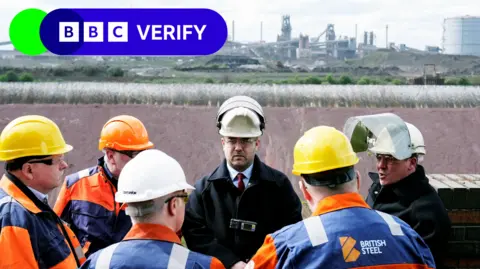The issue of ownership and investment in UK infrastructure by Chinese companies has gained increasing attention, especially following the recent events surrounding the Scunthorpe steel works. The UK government’s recent decision to take control of the Scunthorpe site, previously owned by China’s Jingye Steel, has led to heightened scrutiny regarding potential security risks associated with Chinese investments in critical facilities. Critics argue that the transfer of ownership to foreign entities may threaten national security, leading to deeper questions about the extent of Chinese investments in the UK and their implications for the economy.
According to data from the Office for National Statistics, total Chinese investment in the UK in 2023 amounting to £4.3 billion comprises a small portion of the overall £2 trillion foreign investment in Britain. However, experts caution that this figure fails to capture the full scope of Chinese investment due to reporting methodology, which often does not account for the ultimate source of funds. Furthermore, a report from the American Enterprise Institute suggests that cumulative public and private Chinese investments from 2005 to 2024 could total approximately $105 billion (£82 billion). This indicates that the UK stands as one of the largest destinations for Chinese investment globally, behind only the United States and Australia.
Chinese firms have directed resources into various sectors within the UK, including vital energy and transport infrastructure. For example, the China Investment Corporation holds a 10% stake in Heathrow Airport, and Li Ka-shing’s investment group owns UK Power Networks, responsible for electricity distribution across London and the South East. Additionally, this group holds a significant 76% stake in Northumbrian Water Group. Another notable area of investment is the Hinkley Point C nuclear power station, originally bolstered by China General Nuclear Power Group, which initially held a 33.5% stake, though this has since decreased due to funding issues.
The landscape of Chinese investments extends beyond energy and utilities. Chinese automaker Geely Auto owns the London EV Company, which produces electric black taxis. There is also considerable conditional ownership within consumer brands, such as Greene King, a major pub and brewery chain, and Wolverhampton Wanderers Football Club, partially owned by the Shanghai-based conglomerate Fosun. While certain companies maintain majority stakes, others have minority holdings, raising questions about the operational control these investors wield in UK businesses.
The concerns surrounding Chinese ownership often relate to national security and geopolitical leverage. Prominent instances of debate have arisen with regard to the involvement of Huawei, a Chinese tech company accused of posing risks to the UK’s telecommunications infrastructure. Although initial assessments deemed Huawei’s participation manageable, external pressures led to the eventual requirement for the company to withdraw its involvement from UK networks. Experts caution that Chinese laws mandating cooperation with state intelligence efforts could pose an intrinsic risk regarding espionage and potential disruption of infrastructure for geopolitical advantage.
Despite concerns, some analysts, including Professor Giles Mohan of the Open University, emphasize the profit-driven nature of these investments. They argue that sabotaging UK infrastructure would ultimately undermine the financial interests of Chinese investors, as it risks collapsing the value of their stakes and could prompt government intervention. They advocate for distinguishing between critical infrastructure investments and those in consumer brands, which carry a significantly lower risk profile in terms of public harm.
In conclusion, Chinese investment in UK infrastructure raises essential questions about national security, economic interests, and the balance of foreign ownership in critical sectors. As the dynamics evolve, ongoing scrutiny and informed debate will be vital in addressing potential risks while harnessing the benefits of foreign investment in the UK’s economy.



